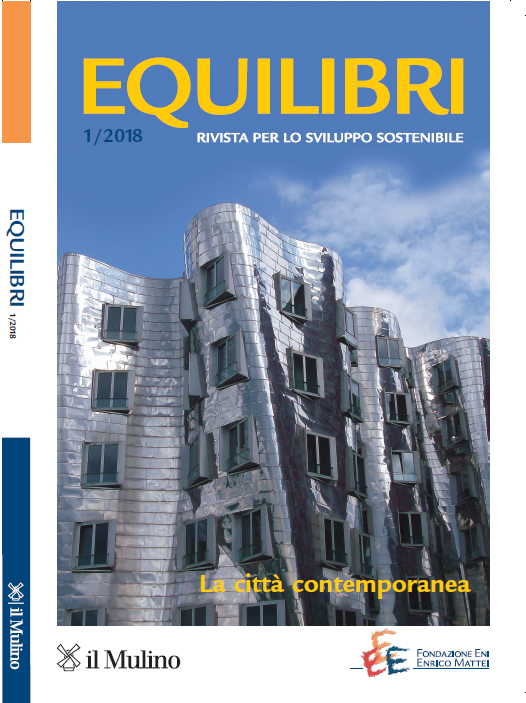Equilibri 2018.01 La città contemporanea
Le città sono il frutto del nostro passato e uno strumento per costruire il nostro futuro.
Mettono in scena la storia e la cultura di una comunità, ne rendono evidenti le condizioni di sviluppo economico e sociale e accolgono, talora in modo inconsapevole, i semi di cambiamenti che nel tempo si renderanno palesi.
Dopo l’apertura di Richard Burdett, che tratta il tema centrale delle disuguaglianze in rapporto ai modelli di crescita urbana, il numero è diviso in tre sezioni.
Nella prima sono raccolte le voci di architetti che studiano, interpretano, costruiscono e, a loro volta, insegnano a costruire le città.
Nella seconda sezione si riflette invece sulle politiche urbane che potremmo definire più urgenti nell’ottica della sostenibilità ambientale, che poi è l’angolo di osservazione che caratterizza «Equilibri».
Nella terza sezione lo sguardo è rivolto alla società urbana, alle esigenze delle comunità che la compongono, in particolare all’evoluzione della domanda abitativa e all’accoglienza di chi non ha nulla.
Il numero si chiude con tre racconti che ci portano in Africa, un continente al centro di ogni progetto di futuro per il Pianeta.
Scarica qui gratuitamente gli articoli di R. Burdett, S. Boeri e C. Zucchi.
Cities are the fruit of our past and a tool to build our future.
They stage the history and culture of a community, and reflect its economic and social development. They nurture – sometimes unknowingly – the seeds of future change.
Richard Burdett opens the issue with an article on inequality and the patterns of urban growth, while the rest of the issue is divided in three sections.
The first collects the views of architects that study and interpret cities, and teach how cities should be built.
The second section looks into the most pressing urban policies in terms of environmental sustainability, which is Equilibri’s underlying theme.
The third section focuses on urban society, the needs and housing requirements of city communities, including the poorest share of the population.
The issue closes with three stories about Africa, the continent at the center of all the projects for the future of our Planet.
Download the articles by R. Burdett, S. Boeri and C. Zucchi.
Le città sono il frutto del nostro passato e uno strumento per costruire il nostro futuro.
Mettono in scena la storia e la cultura di una comunità, ne rendono evidenti le condizioni di sviluppo economico e sociale e accolgono, talora in modo inconsapevole, i semi di cambiamenti che nel tempo si renderanno palesi.
Dopo l’apertura di Richard Burdett, che tratta il tema centrale delle disuguaglianze in rapporto ai modelli di crescita urbana, il numero è diviso in tre sezioni.
Nella prima sono raccolte le voci di architetti che studiano, interpretano, costruiscono e, a loro volta, insegnano a costruire le città.
Nella seconda sezione si riflette invece sulle politiche urbane che potremmo definire più urgenti nell’ottica della sostenibilità ambientale, che poi è l’angolo di osservazione che caratterizza «Equilibri».
Nella terza sezione lo sguardo è rivolto alla società urbana, alle esigenze delle comunità che la compongono, in particolare all’evoluzione della domanda abitativa e all’accoglienza di chi non ha nulla.
Il numero si chiude con tre racconti che ci portano in Africa, un continente al centro di ogni progetto di futuro per il Pianeta.
Scarica qui gratuitamente gli articoli di R. Burdett, S. Boeri e C. Zucchi.
Cities are the fruit of our past and a tool to build our future. They stage the history and culture of a community, and reflect its economic and social development. They nurture – sometimes unknowingly – the seeds of future change.
Richard Burdett opens the issue with an article on inequality and the patterns of urban growth, while the rest of the issue is divided in three sections.
The first collects the views of architects that study and interpret cities, and teach how cities should be built.
The second section looks into the most pressing urban policies in terms of environmental sustainability, which is Equilibri’s underlying theme.
The third section focuses on urban society, the needs and housing requirements of city communities, including the poorest share of the population.
The issue closes with three stories about Africa, the continent at the center of all the projects for the future of our Planet.
Download the articles by R. Burdett, S. Boeri and C. Zucchi.

